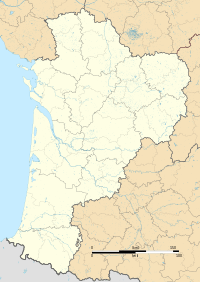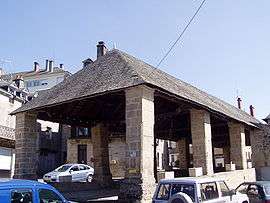Treignac
| Treignac | ||
|---|---|---|
|
Old market | ||
| ||
 Treignac | ||
|
Location within Nouvelle-Aquitaine region  Treignac | ||
| Coordinates: 45°32′15″N 1°47′46″E / 45.537500°N 1.7961°ECoordinates: 45°32′15″N 1°47′46″E / 45.537500°N 1.7961°E | ||
| Country | France | |
| Region | Nouvelle-Aquitaine | |
| Department | Corrèze | |
| Arrondissement | Tulle | |
| Canton | Treignac | |
| Intercommunality | Vézère Monédières | |
| Government | ||
| • Mayor (2014–2020) | Gérard Coignac | |
| Area1 | 36.73 km2 (14.18 sq mi) | |
| Population (2008)2 | 1,390 | |
| • Density | 38/km2 (98/sq mi) | |
| Time zone | CET (UTC+1) | |
| • Summer (DST) | CEST (UTC+2) | |
| INSEE/Postal code | 19269 / 19260 | |
| Elevation |
375–765 m (1,230–2,510 ft) (avg. 482 m or 1,581 ft) | |
|
1 French Land Register data, which excludes lakes, ponds, glaciers > 1 km² (0.386 sq mi or 247 acres) and river estuaries. 2 Population without double counting: residents of multiple communes (e.g., students and military personnel) only counted once. | ||
Treignac is a commune in the Corrèze department in central France.
During the Hundred Years' War it was pillaged by Rodrigo de Villandrando.
Treignac Treignac, designated :('most beautiful villages of France') History Treignac is a most typically French town retaining much of its medieval character, situated on the banks of the Vezzere river on one of the pilgrimage routes to Santiago de Compostella the burial place of St James the Apostle along the way known as the Via Lemovicensis and crosses the 13th-century bridge over the river.
Founded around 800 AD its first Chateau or Castle was built around the year 1000 on an inaccessible rock outcrop on a loop of the Vezere and at the same time the city walls were commenced of which the Chabirande gate of the 13th century still survives although the ramparts were destroyed at the start of the 19th century.
The Chateau was the stronghold of the lands of the Medieval dynasty the Vicomte de Comborn, who had as its first head the man known as Archambaud the butcher as result of his cruel rule
During the Middle Ages the houses were mainly built around the churches of Saint martin, Saint Leoban Saint-Léobon and Saint Jean now disappeared. The current Parish Church is the church of Our lady built originally in the 13C in Romanesque style and formerly part of the Chateau it was originally known as Notre-Dame-de-la-Basse-Cour and later Notre-Dame-des-Bans. when rebuilt in 1471 The bell tower was built in 1602 and one door in the style of Louis XIII (1610-16430 ) remains.
In more modern times the Finot bridge was built in 1824 and the Bargy bridge in 1840. The POC railway line from Seihac to treignac was built in 1904 but closed in 1970 and
Treignac is a free town incorporated under three charters of 1205,1284 and 1483 and is governed by four consuls. before the Revolution it was known as Treignac la Montagne but at the time of Convention or the French Revolutionary Government of 1792/95 it was renamed Treignac The town has been sacked by armies more than once, most notably by Rodrigue de Villandrando) and later during the Wars of Religion in the 16th century. Although rebuilding had started during the Renaissance much of the town dates from the 17th, 18th and 19th centuries whilst also preserving its medieval charm. The beautifully preserved Market hall in the town was originally built in the 12th century, it was rebuilt in the 15th century after being destroyed over a loan between warring factions. The Chapel of the Penitents (Notre Dame de la Paix) was built by the 'Brotherhood of White Penitents' as a reaction against the influx of Protestants in the 17th century.
The Fleyssac house was built in the 15th century against the ramparts and buttresses of the gate of Pradelle, it was sold to the Protestants in 1638, where they celebrated their worship for the following 50 years.
The economy of the region is in part supported by tourism. As former Mayor, Guy Merle explained to Andre de Saint-Rat, kayaking contests and championships are popular. On 27 May 2012 Thomas Chambard won a national kayaking championship here on the Vezere
Population
| Historical population | ||
|---|---|---|
| Year | Pop. | ±% |
| 1962 | 1,795 | — |
| 1968 | 1,826 | +1.7% |
| 1975 | 1,866 | +2.2% |
| 1982 | 1,690 | −9.4% |
| 1990 | 1,520 | −10.1% |
| 1999 | 1,418 | −6.7% |
| 2008 | 1,390 | −2.0% |
See also
References
| Wikimedia Commons has media related to Treignac. |

.svg.png)